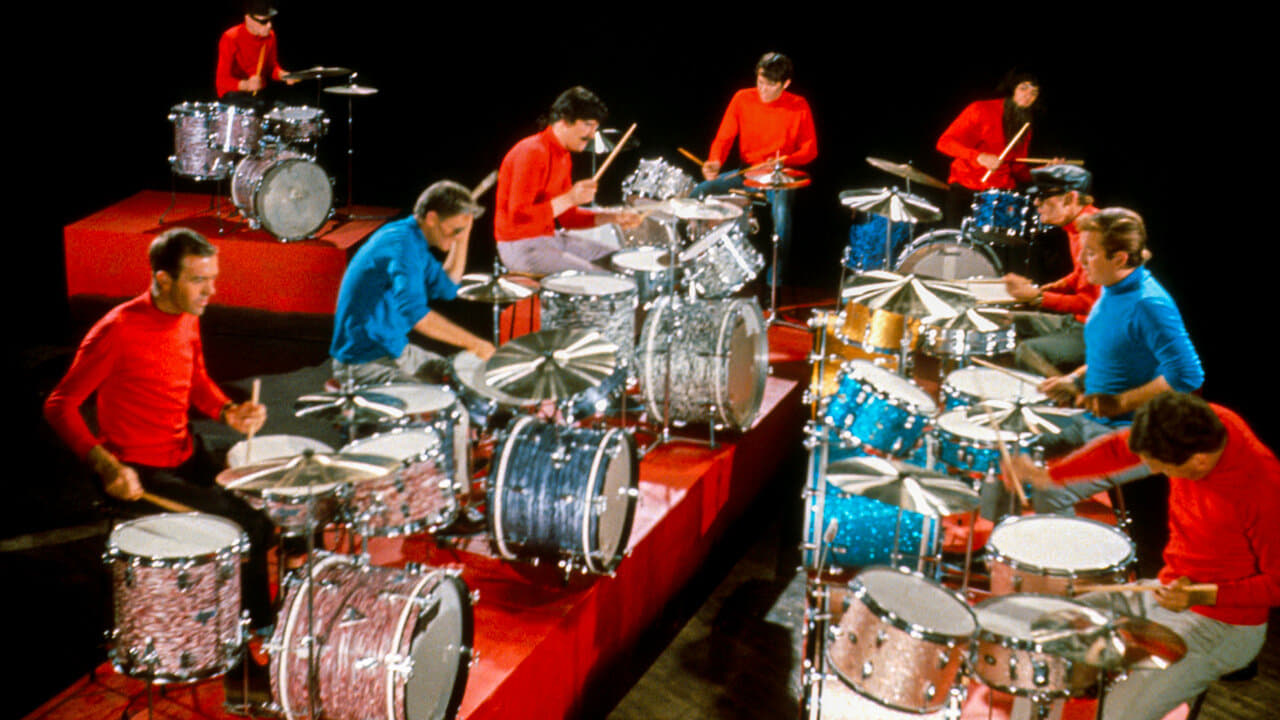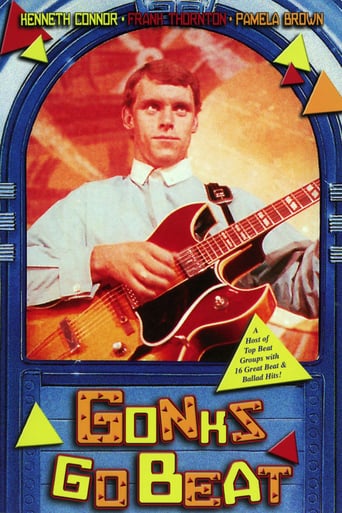



I think this is a new genre that they're all sort of working their way through it and haven't got all the kinks worked out yet but it's a genre that works for me.
View MoreI love this movie so much
Simply Perfect
A film of deceptively outspoken contemporary relevance, this is cinema at its most alert, alarming and alive.
View MoreEver since Chuck Berry crowed "Roll Over, Beethoven!" in the mid-fifties there have been many in the pop world, both fans and performers, who have regarded themselves as being in a state of cultural war against all other musical genres. The rivalry between the "Mod" and "Rocker" sub-cultures of the early sixties- a rivalry which often involved actual violence- was partly based upon differences in musical taste, with the Mods favouring jazz and the Rockers (as their name implies) rock-and-roll."Gonks Go Beat" dramatises another of these musical culture wars, that between pop and what was rather patronisingly known as "easy listening". Unlike the Mods-versus-Rockers clashes, this one did not actually lead to fighting in the streets, but nevertheless generated a surprising amount of ill-feeling. There are still people, now in their sixties or seventies, who consider their youths to have been blighted by the fact that the Beatles' famous double A-side of "Penny Lane" and "Strawberry Fields" was kept off the top of the charts by Engelbert Humperdinck's "Please Release Me". I well remember the disgust of my female teenage contemporaries from the seventies when their idol, Donny Osmond, was replaced at Number One by Perry Como, a man old enough to be his father. It would not have mattered if the Beatles had been bested by the Rolling Stones or Osmond by, say, David Cassidy. What mattered was that pop, the music of youth, progress and freedom, had lost out to "easy listening", the music of the conservative older generation.The central premise of the film is that, at some far-distant date in the future, Planet Earth is dominated by two mutually hostile powers, Beatland and Ballad Isle. Each of these two nations is defined by its attitude to the youth culture of the sixties. Beatland is a land of long, or longish, hair- very long hair was not as fashionable in 1965 as it was to become a few years later- polo-neck sweaters, jeans, sunglasses and, of course, hip and trendy beat music. Ballad Isle is a place of short hair, button-down shirts, pressed slacks and floral dresses. Its inhabitants, of course, only listen to ballads. (The old word "ballad", once little used except by devotees of folk-poetry, had been pressed back into service to mean an easy-listening song).The story is a variant on the "Romeo and Juliet" storyline (but without the tragic ending) in which a Beatland boy, Steve, and a Ballad Isle girl, Helen, fall in love. It also features Wilco Roger, an interplanetary ambassador who has been sent by the galactic powers-that-be to try and reconcile the two warring factions. For the uninitiated the "gonks" of the title were a type of stuffed toy very popular in the sixties and seventies, both with children and occasionally with adults. (Ringo Starr was a noted collector). They feature prominently in the title sequence but do not play a major role in the film itself, although Wilco is frequently threatened by the powers-that-be with exile to Planet Gonk- evidently a dreadful fate- should he fail in his mission.When "Gonks Go Beat" first came out, it did not prove very popular either with young or old. The older generation would have dismissed it as silly kids' stuff, and the youngsters would not have liked the way in which the rather anodyne Steve and Helen, the ostensible protagonists, are overshadowed by middle-aged actors like Kenneth Connor, Frank Thornton, Terry Scott and Arthur Mullard, all well-known comedians or comic actors of the period. They would probably also have been bored by all those ballads which make up around half of the 16 musical numbers. Both generations would have combined in deriding the absurd plot, the indifferent acting, the low quality of the dialogue and the cheap, wobbly sets. It has been named as a contender for the title of "worst British film ever made".The various musical acts featured were mostly, even at the time, obscure; others who may have been well-known at the time have slipped into obscurity since. Probably the best-known performer to a modern audience would be Lulu, a little-known teenager in 1965 but one who shot to stardom later. Despite this, however, the musical numbers are generally cheerful and tuneful, if not particularly memorable; none of them are likely to turn up on a "Great Hits of the Sixties" compilation album.The film's main virtue is that it never takes itself too seriously. Fifty-odd years on from the date when it was made, it may be a dated period piece but its endearing silliness reminds us of just why pop music had such a following in the sixties; it was fun. Nobody could call "Gonks Go Beat" a well-made film, but it can be a curiously enjoyable one, more enjoyable than many films with much higher technical standards. 5/10
View MoreI think if I'm right this is the Ian Gregory who worked with Joe meek great all star cast a film wouldn't be complete without kenneth Connor love frank truly Thornton it's a bit dated but typical of the great music films such as dateline diamonds and I've gotta horse I'm a fan of sixties music and music films
View MoreA martian called Wilco Roger (KENNETH CONNOR) is sent to Earth by his people to resolve a feud between communities known as Beatland and Balladisle. The dispute is over musical differences. Beatland ("If you're with it you're in") loves beat music and rhythm and blues whilst Balladisle is into the softer sentimental ballad music. Each year the top groups from both communities take part in "The Golden Guitar Contest" thrown by the reclusive Mr A&R (FRANK THORNTON) and the winner receives the prize of a golden guitar whilst the losers have their musical instruments confiscated until eight months before the next contest. As much as the two communities despise each other, they are not above sneaking into each other's territory to steal each others musical ideas. Wilco and A&R decide to resolve the chaos before it erupts into war ("It'll mean exile to planet Gonk for me" sniffs Connor) by bringing together a boy and girl, one lives in Beatland and the other in Balladisle, who love each other but the feud is keeping them apart. Wilco and A&R use their mystical power to get them to the contest and they perform a duet which incorporates both musical styles. Mr A&R declares them the winners and orders that both communities will now live in harmony and all types of music will be allowed from now on.An unbelievably stupid attempt to combine swinging sixties pop culture with a Romeo And Juliet inspired romance. The romance is bland without an ounce of Shakespearian tragedy and the comedy falls flat. I.e "I was told that there was a famous author from Earth's past" says Wilco Roger to Mr A&R. "William Shakespeare?" he asks. "Well yes he shook something or other" Wilco replies. That's about as funny as it gets. The sets are cardboard and the tunes are poor. This is a big disappointment as some of the acts that the producers, Peter Newbrook and Robert Hartford-Davis, have assembled for the film are quite impressive. For instance, The Graham Bond Organisation, contained musicians whom were later to become rock legends in their own right such as Ginger Baker with the legendary rock trio, Cream, with Jack Bruce and Eric Clapton. Bond's sax player Dick Heckstall-Smith who can be seen here would go on to join prog rock heroes Colloseum whilst Bond himself (he died in 1974) is now considered to be an important figure of the British R&B boom of that time. They try and make the most of a lackluster number written for them especially for the film, "Harmonica". Even Lulu And The Luvvers and The Nashville Teens are at a loss here too.The story was written by the director Robert Hartford-Davis and cinematographer-producer Peter Newbrook. Both of whom did some interesting work within the British horror wave with the elegant costume horror film, The Black Torment and the Peter Cushing vehicle, Corruption. But both are at a loss here like the beat groups who allowed themselves to be drafted into this rubbish.In summary, if you are thinking of buying the DVD from your local mega store for the music alone, it isn't worth it despite the caliber of some of the musicians on offer. A big disappointment but then again there were so many pop movies made in those days and a lot of them were dire.
View MoreConnoisseurs of dreadful movies cherish the memory of this British equivalent of "Santa Claus Conquers the Martians", stuffed with acts whose plot opposition reflects the clash between post-Beatles rock and slushy romance in the mid-1960s charts. Yes, folks, for every Amen Corner there was an Engelbert Humperdinck, and for each "Hard Day's Night" there was a pop flick like this, with comedians mugging and strutting about the set to give the mums and dads something to laugh at. It should be explained that a gonk was a round, stuffed toy whose gormless features often gaped from the counterpanes of girls' bedrooms. In the catalogue of forgotten UK musical cash-in movies, this one ranks with "Just for Fun" and "The Cool Mikado".
View More